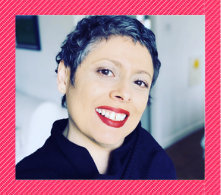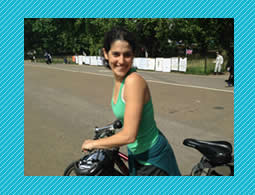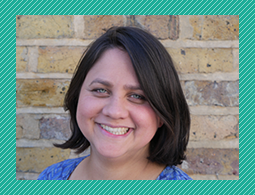The Facilitators
Mariana Martins
 Describing myself as a facilitator in a learning environment as magical as Free We Grow takes me naturally to reflect upon the reasons why I came into the learning journey 20-odd years ago.
Describing myself as a facilitator in a learning environment as magical as Free We Grow takes me naturally to reflect upon the reasons why I came into the learning journey 20-odd years ago.
I have always had to fight against the fixed idea within my family that being an educator was a way to Calvary. Rebellious and predictable as any teenager by the end of the eighties, time had come to decide on a career path to follow and I chose to be a teacher, a language and literature teacher, even though my whole family insisted it would involve low pay and a lot of stress, little dreams accompanied by enormous frustrations. And could they be more wrong? Yes. And could they be more right? I am afraid to say, they were also so very right.
I went into professional teaching in my last year of studies at Universidade Federal Fluminense. I took a job at one of the most prestigious language schools in Brazil: Sociedade Brasileira de Cultura Inglesa. It was a small school branch, but a vivacious and very productive institute of women. We worked with all artistic expressions in our classes as sparks for the production of language, be it spoken or written.
Picasso once said that every child is an artist. You can really witness this idea as truth in any learning space. The younger the pupils, the more easily they catch the intricacies of a language, the better it is for them to produce poems, drawings, or any piece of creative expression with a total lack of self-deprecation. Children will much more fluidly express themselves and quickly become fluent in a second or even third language. The problem, as Picasso himself would put it, is: how to remain an artist as we grow up.
I have, whenever possible, tried to insert art and crafts in my practice as much as I could. I find that adding artistic moments in the language classroom routine was such a luxury, a special and transformative way to experience collective learning, so much better than the trivial, binary standard of introducing subjects and waiting for what the group could produce. This way, not only have I witnessed young people produce texts, poems and improve their speech, I saw them paint, create, give shape and form to their imagination, I experienced first hand the power of emotion, a whole world beyond the classroom. There is nothing more rewarding than this: participating in so many different people’s learning journeys throughout two decades and in so many distinct scenarios.
When I first started working with young people in Brazil it was obvious the lessons flowed when students were involved in the planning and project of learning. In the same way, I believe, that more horizontal structures of work are more popular and pleasant to be involved in than hierarchical work systems and power-driven disputes.
I have taught different age groups here and there. I have told stories and painted cardboard, walls, and T-shirts. I have been in varied kinds of circles of play, drama workshops, and role-playing games.
After coming to the UK in 2003, I had a bit of a varied professional trajectory, having worked in the Embassy of Brazil in London as a translator, as a school librarian, and in theatre as backstage support. Since I was a child, art and crafts have helped me reshape my identity in moments of loss and confusion. Creativity and often alternative ways to express myself and my identity have indeed always defined who I am in the world. I love recycling fabrics, making things, embroidering, knitting, and creating. Asking myself what art is, what beauty is, and how to communicate these concepts have made me realise, at first, as a facilitator, that every learning space should be an atelier. A maker space, maybe a lab. Come to think of it, a learning community must accommodate so many things, so many interests and desires. Learning takes place not just in the woods in Dacres Wood, it happens in the street where we live, it is where every human being interacts and cannot be contained by walls.
Finally, I found in SE23 a co-constructed space where we learn together, no matter where we are. In nature, outdoors or indoors, within our home space or around our community. Learning here takes place anywhere and I am incredibly happy to have found this group of people who believe children are naturally curious beings who need support in their interests and not to fit a mold.
Rowan Salim
 As a geographer, I’m fascinated by the relationship we have with the world around us; how we understand it, interrelate with it and live sustainably within it. For me, Dacres Wood is the result of years of searching for a more harmonious way in which our children can grow connected to the world around them.
As a geographer, I’m fascinated by the relationship we have with the world around us; how we understand it, interrelate with it and live sustainably within it. For me, Dacres Wood is the result of years of searching for a more harmonious way in which our children can grow connected to the world around them.
As a gardener, I recognise the rhythms and cycles, the pace and the patience, the balance and the symbiosis, the uniqueness of every seed and the nurture of the soil. For me Dacres’ Wood is about letting every child grow, with care, love, and attention, looking for the permaculture of learning.
As a humanitarian, I learnt the limitations of trying to help and the importance of recognising my own agency, to make room so that people can find their own solutions and paths, growing stronger through that process. The democratic and humanistic ethos of Dacres’ Wood is about creating that space for self-directed learning where children take responsibility for their own decisions and grow as part of a community, and where my role as a facilitator or mentor is not imposed but there when called upon.
As an educator, I understand that children are born with the innate capacity to learn and the need to do so, that they will seek out knowledge and understanding in their own ways, following developmental phases. I understand the value of pedagogy and that teachers come in many shapes, sizes, and ages. That the most important thing to learn is learning how to learn and developing an understanding of self and self-esteem through that process. At Dacres’ Wood, our emergent curriculum, our connection to the local community and our mixed age range all facilitate children’s diverse learning paths.
As an aunt, a sister, and a daughter, I love playing. I love the giggles, the tickles, and the quizzical puzzles; I love the euphoric eurekas, the shrieks of laughter, and the heartfelt tears that remind me every day that life is worth living. The best thing I can do for those around me is to be myself, and at Dacres Wood, we want to live life with integrity.
Sara Asadullah (Maternity leave)
 Many strands of life and work have come together, bringing me to Free We Grow!
Many strands of life and work have come together, bringing me to Free We Grow!
After studying Archaeology and Anthropology at university, I became passionate about the right to self-determination for communities. I began learning how to facilitate participatory processes, using video as a tool for consensus-building – enabling groups to explore and represent important issues, be creative together, and make films that spark locally-led change. Over 13 years, numerous participatory video projects took me to many countries and contexts, increasingly working with youth groups: young people in urban and rural areas in Asia and Africa; school children in Southwark and Lambeth; youth theatre groups in Kent; young people in museums and cultural organisations; migrant communities and ESOL learner groups.
During all these projects, the aspects I loved most were when I was supporting the groups to build a sense of togetherness, to learn through doing, to experiment and collaborate. I enjoyed holding space for individuals to grow in confidence, to try new things out, and broaden their perspectives. I found delight in picking up on their interests and being able to contribute new things in response, to keep the flow of enthusiasm moving. I found great reward in being there while individuals faced difficulties and overcame them. These are key aspects of being a facilitator for me, and it is a privilege to accompany the children at Free We Grow through these times in their lives.
As a parent, I grew to understand self-directed learning through observing my daughter. When she is allowed time to follow her play urges, learn at her own pace and through her own style, she is confident and solid in her knowledge and capacity. She takes this assurance into her next endeavours, building her autonomy and self-reliance. Trusting her means she can become more responsible for herself and her actions. These are the elements that are most important to me about holding space for the children at Free We Grow.
Joining a local Nature Play group in Sydenham woods, allowed me to experience how nature provides an environment that is balancing and stimulating at the same time, for children and adults alike. Inspired by what I learnt through observing children at nature play, I became a session host and started to work as a Forest School Leader with school children in South London. I see connection to nature as central to well-being, and it is a gift to be based at Dacres Wood, where the children can experience themselves as part of the natural world.
The Free We Grow community has created a space where the children can grow through connection to the real world, with real people all around, and I’m lucky to be sharing my interests and experience with them, and learning from theirs. I love: playing and connecting; talking and wondering about the world, and doing this through music, dancing, drama; reading poetry and stories; making photography and video projects; understanding different cultural perspectives; being in nature, and having fun sharing all this with others!
The Holding Team
Moneer Moukadem
I learned about Free We Grow at the 2022 Summerhill Festival of Childhood. My wife and I had just moved from Abu Dhabi, UAE – our home of 8 years. Despite working in senior school leadership for the past 10 years, I have always been critical about traditional schooling. After becoming parents, my wife and I chose to educate our children outside of the school system, where we founded and led Montessori and Self-Directed Learning coops for our children and community. Free We Grow represents the educational philosophy, values, and learning community we so eagerly yearned for our daughter Maryam who excitedly attends FWG and is thriving! In joining the holding team, I hope to serve the community in financial and operational sustainability, strategic vision, and succession planning. I am also learning from a passionate and skilled team who embodies FWG values and is whole-heartedly dedicated to the project’s success.
